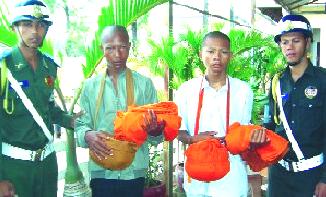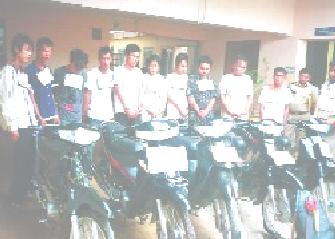RENCONTRER
DIEU |
COURRI@L
2005
|
MEET
WITH GOD |
Chinese illegal immigrants enter Europe with Cambodian passports
(2005-Jul-30)
K.I. : An increasing number of Chinese illegal immigrants (from
mainland China) have been flowing into Europe via Cambodia, where they
get fake Cambodian passports by paying bribes to the authorities. These
new “Cambodian tourists” first go to a non-EU country in central Europe
(Romania, Bulgaria, Yugoslavia/Serbia, Turkey’s European part) with a real
entry visa on their fake passports. Then, they clandestinely travel westwards
by road to finally settle in Germany, France, the UK or the Netherlands.
In Western Europe, they clandestinely live and work in the large Chinese
communities there. In France alone, there are over one million illegal
immigrants including some 100,000 “permanent tourists” from Asia.
Thailand inks contract-farming deal with Cambodia (2005-Jul-23)
BANGKOK, July 20 (TNA) – Thailand has
pledged to help develop farming for a number of plants in Cambodia that
will supply the feedstock industry. Speaking after hosting the second meeting
of the Thai-Cambodian Joint Committee on Agricultural Development, Mr.
Suthiporn Chirapandu, Deputy Permanent Secretary for Agriculture and Co-operatives
said Thailand was going to offer technical support for Cambodia to grow
canola oil seeds, cassava, soy, maize and oil palms. The Cambodian delegation
to the meeting was led by Mr. San Vanty, Mr. Suthiporn’s counterpart.
The transfer of technology is incorporated in the contract farming agreement,
in which Thailand will also offer expertise in post-harvest technology
and processing. Meanwhile, Thailand can buy produce of these trees to produce
feed stock and alternative energy. Cambodia will benefit from income generation
to its farmers, as well as the technology. At the same time, Thailand gets
to buy the raw materials it needs, said Mr. Suthiporn. Currently, Thailand
has to import about two million tonnes of maize to produce chicken feed.
The areas identified to pilot these projects are in the provinces near
the border, such as Udonmeanchey,Siem Reap and Battambang, where transport
link is easy to enable regular follow-up.
Kidnapped on the high seas (2005-Jul-17)
[Lured with promises of work and money, Kouey
Raksmey ended up enslaved for years on
a Thai fishing boat. As Leonie Sherman
explains, his story is just one of millions in the region, but with media
and NGO attention focused on the flesh trade, few seem to have noticed.]
Phnom Penh Post : After her son had been gone a year, Sarun
Ma switched from praying for his return to praying that his soul would
rest in peace. She had heard about the trafficking of men in Thailand and
given up all hope of ever seeing him again. Kouey Raksmey wasn't
dead, but there were certainly times during his three-year
ordeal when he wished he were. In June of 2001, at the age of 21, the former
nightclub singer signed up for a 10-to-15 day stint working on a Thai fishing
boat. He was held as a slave for more than three years before finally making
his escape in August of 2004.
NGO workers fear that the trafficking and exploitation of men on Thai fishing
boats is widespread, but there are no reliable statistics. "This is
an area of trafficking that has been overlooked," says Ann Horsley,
project coordinator at the International Organization of Migration (IOM).
"There's so much anecdotal evidence, but ... the problem has not been sufficiently
documented." Since 2001, the IOM has records of almost 100 male fishermen
who have been repatriated from Thailand, but the scale of the problem is
likely to be far greater. Globally, an estimated 12.3 million people are
trafficked for labor with more than three quarters of that number coming
from the Asia Pacific region, according to a report released by the International
Labor Organization (ILO) in May 2005. The report estimated that less
than 10 percent of labor trafficking victims in Asia and the Pacific end
up in commercial sex work, while almost two
thirds of them, or 6 million people, are coerced into working in fisheries,
agriculture and other economic sectors.
The roots of such trafficking are usually lack of employment and educational
opportunities in rural communities, and poverty. According to the 2005
ILO report, most forced labor in the Mekong River region happens after
voluntary - if ill-prepared and uninformed - migration. But behind the
scant statistics are people with harrowing stories of hardship. Koeuy
left his small village near Battambang and headed across the border, drawn
by promises of good money in Thailand. The captain of a fishing boat in
Phuket gave him a job and promised they would return within 15 days. He
didn't see land again for six months. As Raksmey recounts his story, his
first week at sea was lost in a haze of seasickness so debilitating he
couldn't eat or sleep. The 34 Cambodians and five Thai men on the boat
were forced to work long hours, deprived of sleep, and received no pay
for their exhausting labor. They ate only the fish they caught and meager
portions of rice, often resorting to eating raw fish to avoid starvation.
When the boat finally docked six months later,
the captain, Thay Chun, told the men that they would
be arrested by police and thrown in jail as illegal immigrants
if they tried to escape. Fear prompted all the men to remain on the boat.
They left for sea three days later. The captain feared the men might try
to escape if they returned to Thailand, so he took the boat to Indonesia,
but hit a submerged reef en route and was forced to return to Phuket in
Thailand for repairs. According to Kouey, a Phuket woman named Chhay
Mouy owns the boat he worked on and six others just like it. The fleet,
powered by crews of exploited laborers from Cambodia, Thailand and Burma,
often fish illegally in protected waters. In Phuket, Chun promised his
crew members 10,000 baht each if they would stay and work for five more
months. The prospect of earning a substantial sum of money was enough to
keep all the men with the boat. The captain then gave each crew member
$30, their first payment in almost a year. Kouey used his money to buy
tobacco, noodles and a lot of coffee, which he says he needed to stay awake
during the long hours of forced labor.
From Phuket, the boat headed back out to Indonesia, where they searched
for fish for two months without luck. During stormy seas Kouey was
hit in the arm by a piece of flying metal that smashed bones and tore open
a long, deep gash in his right arm. Chun accompanied him back to Thailand
on a small boat, where doctors inserted a metal plate to replace the crushed
bones in Kouey's forearm. After six weeks in the hospital, Kouey was released
into Songkhla province in southern Thailand. He heard that his boat was
still out at sea and hitched a ride on another boat, determined to find
his crew and the 10,000 baht that he was now less than two months away
from collecting. When he found the boat again, however, he was told he
would need to work an additional five months to receive payment. Caught
out at sea, with no means of escape and no money, he was at the mercy of
his captain and remained with the boat.
The boat returned to Indonesian waters once more and was apprehended by
the coast guard for fishing in protected waters. The owner bailed them
out and the entire crew was released on the condition that they return
to Thailand. Chun ignored the order and kept fishing in Indonesia; soon
the entire crew was behind bars, having been apprehended by the
coast guard again. After a week in jail, the owner bailed them out once
more, and this time Chun headed for Thailand. When the boat landed in Rayong,
Chun gave each crew member $100. Kouey and his friends - all 34
of the Cambodians - bribed Thai police officers to take them to the border.
Because the crew had bought the protection of police, Chun was powerless
to bring them back.
Horsley, the IOM projects officer, says intervention by Thai authorities
is common. "I've heard a number of stories of people being transported
back to the border by Thai police," says Horsley. While human trafficking
for sexual exploitation is a hot issue that attracts aid money, the trade
in male laborers has yet to capture the attention of donors and the general
community. This leaves the men who survive the often grim ordeals isolated
and vulnerable to repeating the cycle if they manage to escape their captors.
While some short-term programs have been developed to try to help specific
groups of recently returned men, there are currently no preventative or
rehabilitation projects in Cambodia.
A spokesman for the Thai embassy in Phnom Penh declined to comment on the
issue, and a senior official at the Ministry of Labor and Vocational Training
said that it was difficult to protect illegal workers abroad. Neither source
would speak on the record. "Quite clearly, women and children are more
vulnerable to trafficking because of cultural considerations," says
Shelley Preece, advisor to the NGO Legal Services for Children and Women
(LSCW). "But men are also vulnerable, particularly once they cross the
border into Thailand. They have no money, no support system, they don't
speak the language and they are often at the mercy of unscrupulous employers."
LSCW is working on a program in Trat, just across the Thai border from
Koh Kong, aimed at helping migrants
from Cambodia who work in Thailand. They hope to educate these migrant
workers about the working conditions they are likely to find in Thailand
and help them figure out strategies to migrate safely. LSCW will use community
campaigns, leaflets and video campaigns to get the word out beginning July
15. "We're only focusing on Trat because of limited resources,"
Preece says, adding that this problem is not limited to one town or province.
Lam Sowathara, a human rights monitor for LICADHO, looks at the
wider context when he thinks about ways to deal with male trafficking.
"To fix this problem will be a big job," Sowathara says. "Education
is the first part. The Ministry of Labor should create a curriculum to
educate people in rural areas about this trafficking. Many of them cannot
read, so perhaps radio can be an effective tool." Ultimately, though,
Sowathara believes the government needs to attract foreign investment and
thus increase job opportunities for young men
in Cambodia. He thinks changing the economic reality of young
men in Cambodia could put an end to human trafficking across the Thai border.
"We need to create an effective legal system, an efficient banking system,
and have peaceful political stability," Sowathara says. "Then we
can create opportunities for foreign investment and create jobs for people
here."
For those who do find themselves trafficked, getting back to Cambodia is
not the end of the ordeal. Many men face crippling debt or feel a sense
of shame that prevents them returning to their home village. Kouey
is lucky; he was welcomed back by relatives and is currently living in
the family home. Kouey's mother, Sarun Ma, is a cheerful woman whose face
lights up when she talks about the day her son returned. "I've never
been so happy in my life," she says, as she nurses the most recent
of her eight children. "We know what he went through is horrible ...
so we try to just give him lots of time to heal. We're not rushing him
to find a job or anything," Kouey's stepfather, Leng Yon says. Kouey's
mother and stepfather see only positive changes in him since his return.
"He was so feisty when he left," says Sarun Ma "Now he's all
grown up, he understands his family is poor and [he] demands less,"
she pauses to laugh. "He's really helpful around the house, too!"
"Before he didn't think," adds his stepfather, Leng Yon. "Now
he thinks about the future, he thinks about making a living and getting
a job." He pauses and adds, "I don't see any negative changes; it's
all been positive." But despite the warm welcome home, Kouey
finds it difficult to move on with his life and struggles with symptoms
commonly associated with post-traumatic stress disorder. He can't stop
thinking about the years of abuse on the fishing boat. He is unable to
concentrate or hold down a steady job, and he is physically weak from the
endless toil. He can't imagine getting married or having children and is
afraid that his experience will haunt him for the rest of his life.
"I regret the mistake I made every day," Kouey says. "I
could have gotten so much done for my family in those years. I wasted so
much time." Nowadays, Kouey is embarrassed by his lean physique and
scarred arms and insists that nobody will employ him to sing on stage.
The shy man becomes more animated when discussing what he'd like to do
to his former captives. "If the captain and boat owner ever come to
Cambodia, I will kidnap them and make them work in the fields, so they
can understand how hard I worked," he says with a rueful grin. "...
I will whip them like cows." These bitter responses and feelings of
low self-esteem are common reactions to a traumatic event, says Dr Sotheara
Chhim, psychiatrist and managing director of the Transcultural Psycho-social
Organization, a community health NGO operating out of Phnom Penh. "These
men were like slaves, they didn't get any payment and some were tortured
severely. Many suffer from depression, post-traumatic stress disorder and
anxiety."
Sotheara's team in Phnom Penh provides debriefing and encourages these
men to talk about their problems in a supportive setting. He teaches them
coping mechanisms and some relaxation techniques. Unfortunately, few people
are aware that these services are available and free of charge. Kouey
isn't, and he fears the long-term effects of his capture. "What I experienced
might even be worse than what happened during the Pol Pot regime,"
Kouey says softly, shaking his head. His mother, a survivor of the Khmer
Rouge regime, agrees. "During the Pol Pot years, even when there was
no food, we could catch insects to eat, but out at sea there's nothing
... to be so isolated at sea like that ..." says Sarun Ma, her voice
trailing off. "No matter what happens, I will love him," Sarun says.
"I'll always love my kids, no matter what they do."
Inflation Et Misère Au Cambodge (2005-Jul-13)
The
National Assembly of the Kingdom of Cambodia
Public Statement, 12 July 2005
Short Term
Measures to Control Inflation
Cambodian Opposition parliamentarians
urge the Government to take the following measures to bring inflation back
to a liveable level. They will offer at least a short term relief to the
majority of the population.
1. Reducing petrol tax to
parity with those in neighbouring countries. The reduction of tax per litre
at the pump will not necessarily decrease the overall tax collections.
Many studies and experiences support a contention that the tax rate reduction
in effect improves the revenue for the government.
2. Giving a clear message
to the market that the authorities, with cooperation of World
Food Program and donor countries, are able to secure sufficient
food supplies. This should help slow down hoarding or private stock piling
of foodstuff that can only fuel expectations or speculations that drive
the inflation up further.
3. Conducting a national
campaign to encourage consumption of substitutes to those commodities with
fast rising prices, and appeal to suppliers not to artificially create
food shortage for profiteering.
4. There is a need to do
more to stabilise the exchange rate so that the poor who use the riel
currency will have some relief from the rising price of imported
foodstuff.
Also consideration should be given
to a prospect of further increase in the price of crude oil; and we have
to be prepared for the impact of such outcome.
The SRP Parliamentarians
|


Koh Santepheap :
Deux jeunes chômeurs se sont déguisés en bonzes et
s'en allaient recueillir des offrandes quotidiennes de nourritures. Ils
ont été piqués par la police....


... 10 autres se faisaient voleurs de motos.
|

|
Radio Free Asia :
7 écoles maternelles
dans la commune de Trach Torng, district
de Oudong, Kampong Speu, peuvent être
forcées de fermer leurs portes. Ouvertes
en
l'an 2000, elles ont accueilli depuis près
de
1000 élèves. Les enseignants,
appartenant à
la communauté, ne recevaient aucun
salaire
mais 450 kg de riz chacun par an. Cette année
de grave sécheresse ne permet plus
à la commune
de rémunérer en natures les
enseignants qui,
survie oblige, doivent se livrer
à d'autres occupations.
|
GOD
vs BUDDHA
|
camboDIATRIBE
|
COURRI@L
2005
( PREVIOUS )
|
AUTRES
SITES KHMERS
|
KUN
PIMOJ 's HOMEPAGE
|
PHN@M-P@NH-P@TINS
|
FRAN-GLO-GIBWÉ
|
CANADA
3 FOUNDERS
|
MES
EMAILS 2003
|
THE
6 COMMANDMENTS
|
MEET
WITH GOD
|
PEN Nearovi, Montréal, Québec, Canada
(nearovi@sympatico.ca)

![]()

